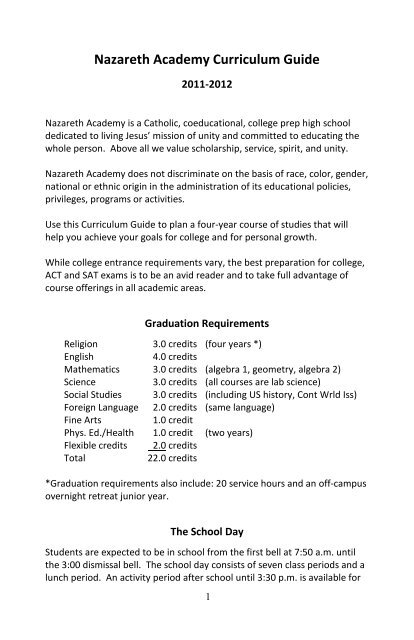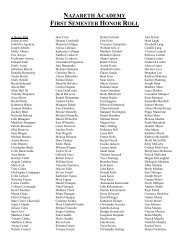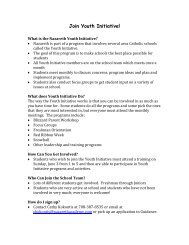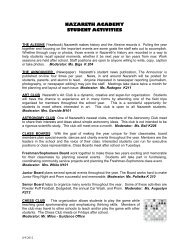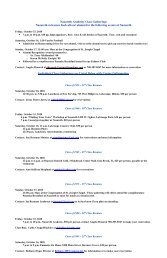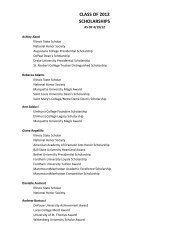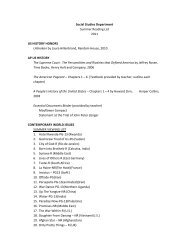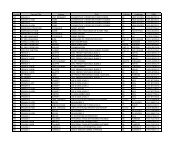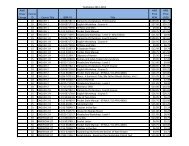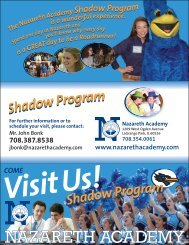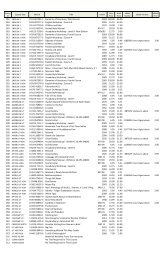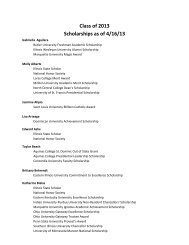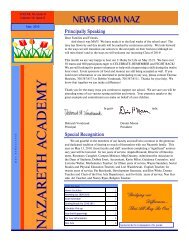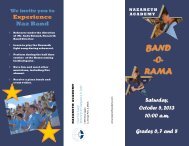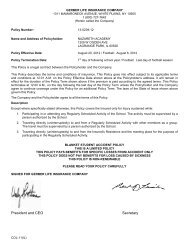Nazareth Academy Curriculum Guide
Nazareth Academy Curriculum Guide
Nazareth Academy Curriculum Guide
Create successful ePaper yourself
Turn your PDF publications into a flip-book with our unique Google optimized e-Paper software.
<strong>Nazareth</strong> <strong>Academy</strong> <strong>Curriculum</strong> <strong>Guide</strong><br />
2011-2012<br />
<strong>Nazareth</strong> <strong>Academy</strong> is a Catholic, coeducational, college prep high school<br />
dedicated to living Jesus’ mission of unity and committed to educating the<br />
whole person. Above all we value scholarship, service, spirit, and unity.<br />
<strong>Nazareth</strong> <strong>Academy</strong> does not discriminate on the basis of race, color, gender,<br />
national or ethnic origin in the administration of its educational policies,<br />
privileges, programs or activities.<br />
Use this <strong>Curriculum</strong> <strong>Guide</strong> to plan a four-year course of studies that will<br />
help you achieve your goals for college and for personal growth.<br />
While college entrance requirements vary, the best preparation for college,<br />
ACT and SAT exams is to be an avid reader and to take full advantage of<br />
course offerings in all academic areas.<br />
Graduation Requirements<br />
Religion 3.0 credits (four years *)<br />
English<br />
4.0 credits<br />
Mathematics 3.0 credits (algebra 1, geometry, algebra 2)<br />
Science<br />
3.0 credits (all courses are lab science)<br />
Social Studies 3.0 credits (including US history, Cont Wrld Iss)<br />
Foreign Language 2.0 credits (same language)<br />
Fine Arts<br />
1.0 credit<br />
Phys. Ed./Health 1.0 credit (two years)<br />
Flexible credits 2.0 credits<br />
Total<br />
22.0 credits<br />
*Graduation requirements also include: 20 service hours and an off-campus<br />
overnight retreat junior year.<br />
The School Day<br />
Students are expected to be in school from the first bell at 7:50 a.m. until<br />
the 3:00 dismissal bell. The school day consists of seven class periods and a<br />
lunch period. An activity period after school until 3:30 p.m. is available for<br />
1
teacher contact, use of the library and computer labs, and extracurricular<br />
activities. Twice a month students are dismissed at 1:30 for faculty and staff<br />
meetings.<br />
<strong>Curriculum</strong><br />
Courses are offered at college prep, honors, and advanced placement levels.<br />
Weighted grades are given for honors and advanced placement courses.<br />
COLLEGE PREP<br />
All of <strong>Nazareth</strong> <strong>Academy</strong>’s courses are college preparatory. Students who<br />
satisfy the graduation requirements are well prepared for succeeding in the<br />
college of their choice.<br />
HONORS COURSES<br />
Honors level courses are offered in English, language, mathematics, science<br />
and social studies courses. Qualified students may pursue honors courses in<br />
any or all disciplines.<br />
Freshmen who score sufficiently high on the HSPT entrance exam and<br />
whose report cards indicate good study habits will be invited into honors<br />
courses.<br />
Students in the honors level of a course must maintain a minimum semester<br />
average of C in order to qualify for honors placement the following year.<br />
A student who finishes first semester with C- or lower in an honors<br />
course may not register for the honors level for the following year.<br />
If the student shows marked improvement for second semester,<br />
the teacher may then invite the student to remain in honors for<br />
the following year.<br />
ADVANCED PLACEMENT<br />
The Advanced Placement Program enables students to pursue college-level<br />
studies while still in high school. Based on their performance on the<br />
rigorous AP Examinations, students may earn college credit and advanced<br />
placement in college programs.<br />
Students at <strong>Nazareth</strong> <strong>Academy</strong> successfully pass AP exams in each academic<br />
discipline. These include: Biology, Calculus AB and BC, Chemistry, Computer<br />
Science, English Language and Composition, English Literature and<br />
2
Composition, French Language, Spanish Language, Physics B, and U.S.<br />
History. See prerequisites for individual courses.<br />
All <strong>Nazareth</strong> <strong>Academy</strong> courses designated as AP have been approved by the<br />
College Board and are authorized to use the “AP” designation. This means<br />
that each of these courses meets or exceeds the expectations of colleges<br />
and universities for that course.<br />
Grade Reports<br />
Grades are updated every two to three weeks on Edline. Report cards are<br />
mailed home quarterly. Semester grades are an average of the two quarter<br />
grades (40% each) and the semester exam (20%). Credit is awarded each<br />
semester. Only the semester grades and credits appear on a student’s<br />
permanent record and college transcript.<br />
Credits<br />
Students may take 6.0 – 7.0 credits each year. Students need to have<br />
earned 6.0 credits to begin sophomore year, 12.0 credits to begin junior<br />
year, and 18.0 credits to begin senior year. Students deficient in credits at<br />
the end of the school year must make up those credits in summer school to<br />
return to <strong>Nazareth</strong> <strong>Academy</strong>.<br />
A student who receives 3 semester grades of F in one semester is asked to<br />
withdraw from <strong>Nazareth</strong> <strong>Academy</strong>.<br />
Eligibility<br />
Notice of ineligibility is sent home with the progress report or quarter<br />
report card if a student has any combination of 2 F’s or Incompletes. When<br />
incomplete grades become passing grades, only 2 F’s will cause a student to<br />
remain ineligible until the next progress report or report card is issued.<br />
Grading Scale<br />
Percent Equivalent<br />
Quality Points<br />
College prep Honors and AP<br />
A- (93-94%), A (95-98%), A+ (99-100%) 4 5<br />
B- (85-86%), B (87-90%), B+ (91-92%) 3 4<br />
C- (77-78%), C (79-82%), C+ (83-84%) 2 3<br />
D- (70-71%), D (72-74%), D+ (75-76%) 1 2<br />
F (0-69%) 0 0<br />
3
Graduation Honors<br />
The valedictorian and salutatorian are named for the graduating class based<br />
on grades and credits in AP and Honors classes. Cords are worn to indicate<br />
National Honor Society, language honor societies, and Quill and Scroll.<br />
Scheduling Classes<br />
Counselors and teachers recommend courses appropriate for students’<br />
ability. Parents receive these recommendations, discuss options with the<br />
student and return the signed form to the Counselor by the deadline.<br />
Course requests are honored if all prerequisites have been met and if<br />
minimum enrollment for the course has been reached. To change a<br />
student’s course requests after June 30 requires a $30 course change fee.<br />
Overview of Four-Year Schedule<br />
Students typically schedule six classes including the following:<br />
Freshmen<br />
Sophomores<br />
Religion 1; Phys Ed (1 sem. each) P.E./Health; Religion 2 (1 sem. each)<br />
English 1 English 2<br />
Foreign language<br />
Foreign language<br />
Algebra 1 or Geometry Geometry or Algebra 2<br />
Physics<br />
Chemistry<br />
World History<br />
Fine Arts<br />
Juniors<br />
Religion 3<br />
American Lit or AP Eng Lang.<br />
Algebra 2 or Precalculus<br />
Foreign language<br />
Biology<br />
U S History<br />
Seniors<br />
World Religions/Peace and Justice<br />
World Lit or AP Lit<br />
FST, Precalculus, or AP Calculus<br />
Foreign language<br />
Environmental Science or AP Science<br />
Contemporary World Issues<br />
Options: Fine arts, writing, computer programming, and social studies electives<br />
Proficiency and Transfer Credits<br />
Eighth grade students who pass a proficiency exam in algebra or foreign<br />
language will earn one credit for that course and begin at the second year<br />
level.<br />
Transfer credits are accepted from accredited schools for courses that are<br />
consistent with <strong>Nazareth</strong>’s curriculum.<br />
4
E N G L I S H<br />
The English department promotes high standards of academic performance.<br />
Through its courses the department emphasizes the importance of writing<br />
effectively, having a command of good grammar, reading literature critically<br />
and appreciating a wide variety of genres, themes, authors, and ideas.<br />
ENGLISH 1 (9)<br />
2 sem. 1 credit<br />
Students gain competence in writing skills and the ability to read critically<br />
the various genres such as mythology, poetry, short story, non-fiction,<br />
drama, and the novel. Emphasis is on grammar and vocabulary, note<br />
taking, paragraph and essay writing, and careful reading. The research<br />
paper is introduced second semester.<br />
ENGLISH 1 HONORS (9)<br />
2 sem. 1 credit<br />
Prerequisite: Invitation from the department<br />
Students gifted in reading and writing ability are challenged to read and<br />
write intensively with a focus on critical thinking. Areas of study are the<br />
short story, non-fiction, poetry, mythology, a Shakespearean play and<br />
novels. Vocabulary and grammar are stressed throughout the year, and the<br />
research paper is introduced.<br />
ENGLISH 2 (10)<br />
2 sem. 1 credit<br />
This course combines critical reading with writing. Various works of fiction,<br />
nonfiction, poetry and contemporary or classic literature generate<br />
discussion, analysis, and writing activities. Students learn the steps in the<br />
writing process, from prewriting to final drafting, and write expository,<br />
descriptive, narrative, persuasive, and research projects while building<br />
vocabulary and grammar skills.<br />
ENGLISH 2 HONORS (10)<br />
2 sem. 1 credit<br />
Prerequisite: English 1 Honors or teacher recommendation<br />
This course is designed for serious, self-motivated students of language and<br />
literature. Vocabulary, grammar and syntax continue to be stressed.<br />
Students write frequently in the various discourses based on their close<br />
reading of short stories, poetry, novels and a Greek and Shakespearean<br />
tragedy. Students also research and write a formal research paper and a<br />
summary of critical sources.<br />
5
AMERICAN LITERATURE (11)<br />
2 sem. 1 credit<br />
Students develop an understanding of American literature from indigenous<br />
and early European inhabitants to current times through novels, drama,<br />
poetry and essays. Students examine the influence of culture and history<br />
on literature and connect literature to the current culture. Writing<br />
experiences include literary analyses and a research paper, and in concert<br />
with other course activities they will continue to improve their grammar<br />
and expand their vocabulary and writing skills.<br />
AMERICAN LITERATURE HONORS (11)<br />
2 sem. 1 credit<br />
Prerequisite: English 2 Honors or teacher recommendation<br />
This course surveys American literature and literary movements and<br />
challenges serious students with long-range assignments and research<br />
projects. Students learn to analyze literature in terms of historical<br />
importance, cultural background, and literary significance. Projects are<br />
required each semester, with a research paper during the second semester.<br />
Students enrich their writing skills and prepare for SAT and ACT tests with<br />
vocabulary and grammar work.<br />
AP ENGLISH LANGUAGE & COMPOSITION (11)<br />
2 sem. 1 credit<br />
Prerequisite: English 2 Honors B average, 3.8 GPA, writing sample and teacher<br />
recommendation<br />
This course, leading to the AP exam, empowers students to read<br />
analytically, identifying and explaining an author’s use of rhetorical<br />
strategies and techniques. Students learn to apply these varied techniques<br />
and strategies to their own writing. Texts come predominantly from nonfiction<br />
American literature, and writing tasks include response to and<br />
analysis of literary texts, expository and argumentative compositions and a<br />
synthetic research paper with attention to the process of writing.<br />
WORLD LITERATURE (12)<br />
2 sem. 1 credit<br />
This course is a regional exploration of significant works from ancient to<br />
modern day. It includes extensive reading, discussion, and analysis of oral<br />
and written literature including poetry, narratives and drama and examines<br />
how these works remain relevant to students’ experiences. The course will<br />
trace common themes and traditions and discuss universal human<br />
experiences that transcend culture.<br />
6
WORLD LITERATURE HONORS (12)<br />
2 sem. 1 credit<br />
Prerequisite: American Lit Honors or teacher recommendation<br />
Although the World Literature Honors course shares the same content and<br />
regional approach as the college prep level, the honors course differs in<br />
several respects. Teachers will cover the material in more depth and with a<br />
faster pace, assignments and projects will be more frequently assigned with<br />
expectations more rigorous in scope, and a greater emphasis will be placed<br />
on analytical writing.<br />
AP ENGLISH LITERATURE & COMPOSITION (12)<br />
2 sem. 1 credit<br />
Prerequisite: AP English Language or American Lit Honors, B average, 3.8 GPA,<br />
writing sample and teacher recommendation<br />
This course, leading to the AP exam, gives students the opportunity to<br />
explore how a writer’s techniques contribute to the reader’s enjoyment and<br />
understanding of the work. Students critically read and analyze classic and<br />
modern fiction, poetry, and drama that typically appear on the AP<br />
recommended reading list. They discuss and write about an author’s style,<br />
structure, tone and theme as well as figures of speech, imagery, and<br />
symbols.<br />
JOURNALISM (10,11,12)<br />
1 sem. 0.5 credit<br />
Prerequisite: C or better in required English courses or instructor approval<br />
Journalism gives students a practical opportunity to practice writing clearly<br />
and accurately. Students study the news story, feature story, sports story,<br />
editorial, and entertainment review. There is focus on interviewing<br />
techniques, copy-editing, headline writing, layout and design, and<br />
journalism and the law.<br />
CREATIVE WRITING (10,11,12)<br />
1 sem. 0.5 credit<br />
Prerequisite: C or better in required English courses or instructor approval<br />
Creative Writing is for students with well-developed writing skills who want<br />
to explore poetry, fiction, and the personal narrative. Students must have<br />
an interest in writing and be motivated to work independently to complete<br />
multiple revisions of each assignment. Students’ work is read and critiqued<br />
by other class members.<br />
7
F I N E A R T S<br />
The Fine Arts Department, composed of Art, Drama and Music, aims to<br />
develop an appreciation of the fine arts and a facility in the performance of<br />
these arts.<br />
INTRODUCTORY ART (9,10,11,12)<br />
A R T<br />
8<br />
1 sem. 0.5 credit<br />
A foundation background of art history and appreciation is provided<br />
through slides, videos, and virtual museum tours. Simple projects using<br />
paint, cut paper, and graphite are created to explore color, line, value,<br />
shape, and texture. Museum visits, art website exploration, and<br />
independent study are optional offerings to assess learning. This course is<br />
required for entry into upper level art courses.<br />
TWO-DIMENSIONAL DESIGN (10,11,12)<br />
1 sem. 0.5 credit<br />
Prerequisite: Introductory Art<br />
This course explores the concepts of two-dimensional art forms. Design<br />
principles and their application are applied to studio problems in drawing,<br />
painting and printmaking.<br />
THREE-DIMENSIONAL DESIGN (10,11,12)<br />
1 sem. 0.5 credit<br />
Prerequisite: Introductory Art<br />
Ideas are formulated and visualized through the utilization of materials and<br />
techniques related to sculpture, clay work and fiber arts.<br />
PHOTOGRAPHY (11,12)<br />
1 sem. 0.5 credit<br />
Prerequisite: Introductory Art<br />
This is an introductory course with basic theory, darkroom procedures and<br />
picture taking. Students must have a 35mm camera with an adjustable<br />
shutter and diaphragm; automatic cameras must have manual override.<br />
Composition and color will also be explored using digital cameras and<br />
Photoshop. Photography is required of yearbook and newspaper<br />
photographers with no experience. Students purchase their own paper and<br />
film.<br />
STUDIO 1, 2, 3, 4 (11,12)<br />
1 sem. 0.5 credit<br />
Prerequisite: 2 semesters of art (B average) and consent of instructor<br />
Studio affords students an opportunity to synthesize the varying<br />
experiences and ideas encountered in foundation courses and to develop
an emerging personal style. Students choose one medium to explore in<br />
depth, studying its history, the use and innovations of the medium by<br />
contemporary artists and the application of these findings to the student’s<br />
work. Students purchase their own materials.<br />
SPEECH (9,10,11,12)<br />
D R A M A<br />
1 sem. 0.5 credit<br />
This course is designed for students who have not had any training in a<br />
formal speaking situation. It focuses on interpersonal communication skills,<br />
group discussion skills, speech organization and delivery. The emphasis of<br />
this course is on performance. This course is a prerequisite for Acting.<br />
INTRODUCTION TO THEATRE (10,11,12)<br />
1 sem. 0.5 credit<br />
Prerequisite: Speech<br />
This course is designed for students interested in studying play production<br />
and history of theatre and learning critical analysis of theatre productions.<br />
Students attend two plays during the semester. Discussion includes an<br />
overview of several eras of theatre, an evaluation of the plays and what<br />
makes a play “great.”<br />
ACTING 1 (10,11,12)<br />
2 sem. 1 credit<br />
Prerequisite: Speech<br />
This course is designed for students interested in performing. Activities<br />
include pantomime, improvisations and character analysis. Final projects<br />
include scenes or one-act plays.<br />
ADVANCED ACTING (11,12)<br />
2 sem. 1 credit<br />
Prerequisite: Acting 1 and consent of instructor<br />
Designed for students interested in performing, this course focuses on<br />
student-written productions, one-act plays, a children’s play first semester,<br />
and a student-directed one-act play second semester.<br />
ACTING 3 (12)<br />
2 sem. 1 credit<br />
Prerequisite: Advanced Acting and consent of instructor<br />
This course is designed for students interested in performing and directing,<br />
with a strong emphasis on student directing. Activities include directing<br />
Advanced Acting students in the children’s play and one-acts.<br />
9
M U S I C<br />
INTRODUCTION TO MUSIC (9, 10, 11, 12)<br />
1 sem. 0.5 credit<br />
This class is about the composition of music, how it is performed, its<br />
aesthetics, and how music evolved. Students learn the basic elements of<br />
music such as melody, harmony, rhythm, and structure as well as the<br />
different historical periods of musical development through lecture and<br />
listening to musical examples.<br />
CONCERT BAND (9,10,11,12)<br />
2 sem. 1 credit<br />
Concert Band is open to all band students with two years of experience on a<br />
concert band instrument. No audition is necessary. Students learn the<br />
basic concepts of instrumental music making. The literature level is<br />
intermediate to advanced high school level. Members participate in<br />
Marching Band in the fall and Pep Band in the winter. (Exception is made<br />
for varsity athletes in season.)<br />
WIND ENSEMBLE (10,11,12)<br />
2 sem. 1 credit<br />
Enrollment in the Wind Ensemble is by audition only. The group learns<br />
advanced concepts of music through the highest level of musical literature.<br />
The music assigned is generally at a college or professional level. Members<br />
not in athletic season participate in Marching Band in the fall and Pep Band<br />
in the winter.<br />
CONCERT CHOIR (9,10,11,12)<br />
2 sem. 1 credit<br />
The class includes a variety of vocal experience. Students are assessed at<br />
their current vocal level and encouraged to grow in beginning music theory,<br />
sight singing, general ensemble work in two- to four-part settings, tone and<br />
pitch quality, proper breathing techniques and an emphasis on blending<br />
one’s voice among others. The repertoire includes but is not limited to<br />
classical, cultural, sacred and contemporary Christian, popular, holiday, and<br />
Broadway music. The Concert Choir also functions as the Liturgical Choir for<br />
the all-school liturgies. Each student in the Concert Choir is eligible to<br />
audition for our vocal jazz ensemble “Progressions.” This ensemble is made<br />
up of ten to 12 voices that concentrate on a capella singing as well as other<br />
complex literature.<br />
10
F O R E I G N L A N G U A G E S<br />
The general objective of the Language Department is to accomplish the<br />
National Goals and Standards of foreign language learning in the following<br />
areas: communication, connections with other disciplines, comparisons with<br />
native language, understanding of culture, and use of language in the<br />
community, thus enhancing students’ ability to function more effectively in<br />
the global community.<br />
FRENCH 1<br />
F R E N C H<br />
11<br />
2 sem. 1 credit<br />
This course introduces the study of the French language and the culture of<br />
French-speaking people. Students learn basic grammar, pronunciation,<br />
reading, writing and elementary conversations through a variety of<br />
activities.<br />
FRENCH 2 and FRENCH 2 HONORS<br />
2 sem. 1 credit<br />
Prerequisite: French 1; teacher recommendation for honors<br />
In this course students continue to develop the fundamental skills of<br />
speaking, reading and writing French. The language is related to daily life<br />
through the study of light literature, current events and culture. In<br />
addition, honors students are required to take more comprehensive tests,<br />
and complete additional readings, proficiency projects, and reports.<br />
FRENCH 3 and FRENCH 3 HONORS<br />
2 sem. 1 credit<br />
Prerequisite: French 2 or French 2 Honors<br />
This course centers on an in-depth grammar study and extensive vocabulary<br />
development. Reading and self-expression are emphasized. A novel and<br />
several short stories are read and discussed. Honors students are required<br />
to take more comprehensive tests and complete additional readings,<br />
proficiency projects, and reports.<br />
FRENCH 4 HONORS<br />
2 sem. 1 credit<br />
Prerequisite: French 3 Honors or teacher recommendation<br />
This course is designed for serious students of the French language.<br />
Expression in oral and written language continues to be emphasized; the<br />
study of French literature and culture is continued. Some AP materials are<br />
included to prepare those students who are intending to take the AP exam.<br />
Those students also work independently and meet with the teacher outside<br />
of class time.
AP FRENCH<br />
12<br />
2 sem. 1 credit<br />
Prerequisite: French 4 Honors or invitation by department<br />
This advanced class emphasizes skills in communicating including<br />
understanding French in various contexts; vocabulary for reading nontechnical<br />
writings; and expressing oneself coherently, resourcefully,<br />
creatively, and with fluency and accuracy in both written and spoken<br />
French. Course content includes the arts, current events, literature, and<br />
sports. Materials used include audio and video recordings, films,<br />
newspapers and magazines, and practice tests for the AP exam.<br />
ITALIAN 1<br />
I T A L I A N<br />
2 sem. 1 credit<br />
In Italian 1 students learn basic grammar and vocabulary. Students develop<br />
fundamental skills of reading, writing, speaking and listening. Students are<br />
introduced to Italian geography and customs as well as to the contributions<br />
Italians and Italian-Americans have made to society. Tutti Benvenuti!<br />
ITALIAN 2 and ITALIAN 2 HONORS<br />
2 sem. 1 credit<br />
Prerequisite: Italian 1<br />
Italian 2 and 2 Honors are a continuation of students’ study of essential<br />
Italian grammar concepts and vocabulary. Listening and speaking skills are<br />
emphasized through the use of Italian media. Students further develop<br />
their reading and comprehension skills through short selections dealing<br />
with Italian culture, history, and a short chapter book in Italian.<br />
ITALIAN 3 and ITALIAN 3 HONORS<br />
2 sem. 1 credit<br />
Prerequisite: Italian 2 or Italian 2 Honors<br />
This course continues to develop students’ comprehension as well as oral<br />
and written proficiency. The course includes further study of Italian history,<br />
culture, art, and film, and includes a trip to the Lyric Opera of Chicago to see<br />
an opera in Italian. Students realize their mastery of Italian by reading two<br />
short novellas in Italian, Mi diverto con Gianluigi! and Carlo Collodi’s Le<br />
Avventure di Pinocchio and by viewing Italian films.<br />
ITALIAN 4 and ITALIAN 4 HONORS<br />
2 sem. 1 credit<br />
Prerequisite: Italian 3 or Italian 3 Honors<br />
This course is designed for students who are motivated to increase their<br />
oral and written proficiency. Grammar and vocabulary are reviewed by
eading short stories and two novellas in Italian as well as through oral and<br />
written text-based activities. Continued study of Italian history, literature,<br />
art, film, and cuisine allows students to deepen their understanding of the<br />
Italian culture and people. An opportunity to see an Italian opera at the<br />
Lyric Opera of Chicago helps to increase student awareness of the<br />
contributions of Italians and Italian-Americans to Western Civilization.<br />
SPANISH 1<br />
S P A N I S H<br />
13<br />
2 sem. 1 credit<br />
This course introduces the student to the language and culture of native<br />
speakers in Spain and Latin America. Students learn pronunciation, basic<br />
grammar, and vocabulary, and begin to develop fundamental skills of<br />
reading, writing, listening, and speaking.<br />
SPANISH 1 accelerated<br />
2 sem. 1 credit<br />
The accelerated Spanish 1 course develops the same skills as the college<br />
prep class but moves at a faster pace. Additional supplementary material<br />
and AP preparation is introduced to challenge the student and prepare<br />
them for the honors Spanish classes.<br />
SPANISH 2<br />
2 sem. 1 credit<br />
Prerequisite: Spanish 1<br />
Students study essential grammar concepts and vocabulary. Listening and<br />
speaking skills are emphasized through the use of dialogs, videos, and CDs.<br />
Students develop reading and comprehension skills through cultural articles<br />
related to everyday life.<br />
SPANISH 2 HONORS<br />
2 sem. 1 credit<br />
Prerequisite: B in Spanish 1 accelerated and teacher recommendation<br />
Students study essential grammar concepts and vocabulary. Listening and<br />
speaking skills are emphasized with the use of videos and CDs. Students<br />
develop reading and comprehension skills through cultural articles related<br />
to everyday life. Spanish literature, art, and history are explored through a<br />
novel which encourages discussion.<br />
SPANISH 3<br />
2 sem. 1 credit<br />
Prerequisite: Spanish 2<br />
Students develop grammatical concepts and acquire vocabulary necessary<br />
for written and oral self-expression. A short novel provides students with
cultural insights, appreciation for literature, and opportunities for group<br />
discussions in Spanish.<br />
SPANISH 3 HONORS<br />
2 sem. 1 credit<br />
Prerequisite: Spanish 2 Honors and teacher recommendation<br />
This course provides in-depth grammar study and extensive vocabulary<br />
development. Reading and self-expression are emphasized. Spanish<br />
history, literature, art, and culture are explored. Students read an<br />
unabridged novel which promotes and develops written and oral<br />
proficiency in Spanish.<br />
SPANISH 4<br />
2 sem. 1 credit<br />
Prerequisite: Spanish 3<br />
With this course students will complete four years of language study to<br />
better fulfill college language requirements. The study of grammar is<br />
completed, and fluency in oral and written expression is emphasized<br />
through reading and discussion of selected literary works.<br />
SPANISH 4 HONORS<br />
2 sem. 1 credit<br />
Prerequisite: Spanish 3 Honors and teacher recommendation<br />
This course is designed for serious students of the Spanish language.<br />
Fluency in oral and written expression is emphasized, and the study of<br />
Spanish and Latin American literature is continued. Students may be invited<br />
to take the Spanish Language AP exam.<br />
AP SPANISH<br />
2 sem. 1 credit<br />
Prerequisite: Spanish 4 Honors and invitation by department<br />
This course is designed for serious students who are motivated to increase<br />
their oral and written proficiencies through detailed and intense review of<br />
Spanish grammar and specialized vocabulary, reading short stories and a<br />
play in Spanish, and oral and written text-based activities. The continued<br />
study of Spanish history, literature, and art will allow students to deepen<br />
their understanding of the Hispanic peoples.<br />
M A T H E M A T I C S<br />
Mathematics is used in research in the physical sciences, social sciences,<br />
business and other practical applications. Our mathematics curriculum aims<br />
14
to prepare students for college admission, facilitate further study in<br />
mathematics and related fields, and develop interest in the structure and<br />
applications of mathematics.<br />
ALGEBRA 1<br />
2 sem. 1 credit<br />
Students learn to generalize arithmetic operations, to solve and graph<br />
equations and to apply algebra in problem solving. Emphasis is placed on<br />
developing reasoning skills, communicating mathematically and making<br />
connections between mathematics and other fields of study. Calculator use<br />
begins second semester.<br />
ALGEBRA 1 HONORS<br />
2 sem. 1 credit<br />
Prerequisite: Invitation from the department<br />
This course covers the topics of Algebra I in greater depth, at a more<br />
accelerated pace, and requires independent work from the student.<br />
GEOMETRY<br />
2 sem. 1 credit<br />
Prerequisite: Algebra 1<br />
Geometry enables students to connect the physical and visual world with<br />
algebra, to become independent thinkers and learners, and to strengthen<br />
their intuitive skills. Transformations, constructions, algebraic and<br />
geometric properties, deductive and inductive reasoning, geometric<br />
concepts with respect to the coordinate plane, and three-dimensional<br />
objects are some of the topics studied.<br />
GEOMETRY HONORS<br />
2 sem. 1 credit<br />
Prerequisite: Teacher recommendation<br />
Geometry Honors considers the topics of Geometry in greater depth,<br />
considers more challenging problems and covers basic concepts at a faster<br />
pace. Formal geometric proof is included along with an introduction to<br />
probability.<br />
ALGEBRA 2<br />
2 sem. 1 credit<br />
Prerequisite: Geometry<br />
Algebra 2 reinforces the concepts and skills of Algebra 1 and introduces the<br />
topics necessary for further study in mathematics. It includes a study of<br />
quadratic equations; polynomial functions; rational expressions; radicals;<br />
irrational numbers; graphs of linear, quadratic, exponential and logarithmic<br />
functions; and an introduction to statistics and trigonometry.<br />
15
ALGEBRA 2/TRIGONOMETRY HONORS<br />
16<br />
2 sem. 1 credit<br />
Prerequisite: Teacher recommendation<br />
This is a transitional course linking the traditional high school mathematics<br />
courses (Algebra 1 and Geometry) and those requiring a higher level of<br />
mathematical thinking (Precalculus and Calculus.) The skills of Algebra 2 are<br />
covered along with an in-depth study of functions and an introduction to<br />
trigonometry. Emphasis is placed on the student becoming a problemsolver<br />
and an independent learner.<br />
FUNCTIONS, STATISTICS AND TRIGONOMETRY<br />
2 sem. 1 credit<br />
Prerequisite: C or better in each semester of Algebra and teacher<br />
recommendation<br />
This course is recommended as a fourth year math course preparing<br />
students for college level math courses. It focuses on the study of various<br />
functions, statistics, and trigonometry with the aid of the graphing<br />
calculator and computer. The TI-83+ graphing calculator is required for this<br />
course.<br />
PRECALCULUS HONORS<br />
2 sem. 1 credit<br />
Prerequisite: Teacher recommendation<br />
This course is a preparation for the study of calculus and other college level<br />
math courses. The contents include the study of the behavior of the<br />
following functions: polynomial, rational, exponential, logarithmic, and<br />
trigonometric functions and their application to real life situations.<br />
Additional topics include analytic geometry, systems of equations, and<br />
other advanced topics in algebra.<br />
AP CALCULUS AB<br />
2 sem. 1 credit<br />
Prerequisite: Precalculus Honors and teacher recommendation<br />
This college level Advanced Placement course covers the properties of<br />
limits, differentiation, integration, and their applications. A TI-89 graphing<br />
calculator is required. Students study calculus analytically, numerically, and<br />
graphically to prepare for the required AP Calculus AB exam.<br />
AP CALCULUS BC<br />
2 sem. 1 credit<br />
Prerequisite: AP Calculus AB and teacher recommendation<br />
Calculus BC is a full year course in the calculus of functions in a single<br />
variable. It includes a review of topics covered in Calculus AB plus the<br />
following topics: parametric, polar and vector functions and the application<br />
of derivatives and integrals; logistic differential equations; polynomial
approximations and infinite sequences and series. The TI-89 graphing<br />
calculator is required for this course.<br />
COMPUTER SCIENCE 1<br />
2 sem. 1 credit<br />
Prerequisite: Algebra 1<br />
This course focuses on computer document creation and introductory<br />
computer programming concepts, including the structure of HTML 5<br />
documents, design, good markup techniques, and the validation of web<br />
documents. Topics include text formatting, lists, tables, an introduction to<br />
CSS3 and issues of Internet Law. Students design web pages for usability<br />
and readability. Programming concepts are introduced using the JavaScript<br />
language as it is applied to web programming. An extension of the course<br />
will include the development of Apps for the iPhone, iPod and iPad.<br />
AP COMPUTER SCIENCE<br />
2 sem. 1 credit<br />
Prerequisite: Geometry or consent of instructor<br />
Students become familiar with the principles of the Java programming<br />
language. Through hands-on exercises, students explore Java fundamentals<br />
as well as basic concepts of object-oriented programming. Topics include<br />
the study of classes, methods, inheritance, polymorphism, and the AP<br />
Computer Science Case Study. In addition students read, use and modify<br />
templated AP classes. The extension of the course will include the<br />
development of Android Apps.<br />
P H Y S I C A L E D U C A T I O N<br />
In Physical Education students develop basic skills and physical fitness<br />
necessary to participate in a variety of conditioning exercises and sport<br />
activities. Success in skill performance is dependent upon the development<br />
of selected aspects of fitness. Continued maintenance of physical fitness is<br />
essential for good health and well-being. Physical education is required of<br />
freshmen and sophomores.<br />
PHYSICAL EDUCATION 1 (9)<br />
1 sem. 0.50 credit<br />
This course gives students basic knowledge and skills in numerous team and<br />
individual sports. This course strives to promote confidence, leadership,<br />
and sportsmanship in athletic activities.<br />
17
PHYSICAL EDUCATION 2 (10)<br />
1 sem. 0.25 credit<br />
Students will acquire the ability to perform more complex movement<br />
patterns in physical activities involving personal conditioning, team<br />
activities, and individual sports. Students will be able to participate in<br />
sports not covered in P E 1.<br />
HEALTH (10)<br />
1 sem. 0.25 credit<br />
Health education addresses the principles of nutrition, alcohol, tobacco,<br />
drug use and abuse, and the prevention and treatment of diseases,<br />
including STD’s. This course encourages students to reflect on themselves,<br />
their development, needs and capacities, persuading them to act in ways<br />
that will promote their optimum health.<br />
P R A C T I C A L A R T S<br />
COMPUTER APPLICATIONS WITH KEYBOARDING<br />
1 sem. 0.5 credit<br />
In this one-semester course students learn Cyberlink Power Director 8,<br />
Microsoft Word, Excel, PowerPoint, and Access as well as ergonomically<br />
correct computer skills. Students learn to create business letters, reports,<br />
tables, academic and professional résumés, slideshows, and produce a<br />
movie.<br />
R E L I G I O N<br />
The Religion Department is committed to educating students as mature<br />
Catholic Christians by emphasizing both faith development and<br />
understanding of Catholic teaching. Students are encouraged to recognize<br />
the unconditional love of God in an atmosphere in which questions can be<br />
asked, forgiveness experienced, faith shared and service encouraged. A<br />
<strong>Nazareth</strong> graduate should have a spiritual vision based on the teaching of<br />
Christ, with a commitment to serving others and building a just world “that<br />
all may be one.”<br />
RELIGION 1 (9)<br />
18<br />
1 sem. 0.5 credit<br />
Since students come to <strong>Nazareth</strong> with a variety of religious backgrounds<br />
and experiences, this course introduces them to the fundamentals of
Catholicism. Instruction is both academic and experiential to encourage<br />
students to be open to God’s gift of faith. The goal is to understand<br />
Catholic Christian beliefs and rituals as well as to integrate faith into daily<br />
life. The course teaches the four “pillars” described in the Catechism of the<br />
Catholic Church: Creed, Liturgy, Morality and Prayer. Students will<br />
understand our faith as sacramental, and realize that the sacraments are<br />
grounded in Jesus, in the church, and in the sacredness of God’s creation.<br />
Prayer and morality are presented in the context of Scripture, and students<br />
are encouraged to become involved in the Christian community. There is<br />
also a short unit on Christian values relating to sexuality.<br />
CHURCH HISTORY (10)<br />
l sem. 0.5 credit<br />
This course is designed to help students come to an adult knowledge of<br />
their Catholic faith by learning the history of the Church. Beginning with<br />
Pentecost, the story of the Church is a story of sin and of God’s grace and<br />
the promise of Jesus to be with his Church until the end of time. Students<br />
see how this journey through history has shaped the Church today and<br />
reflect on their own role in it. In this chronological study there is an<br />
emphasis on Spirit-filled personalities who have guided the Church at key<br />
moments. There are opportunities for students to share faith as well as to<br />
voice their own questions and concerns. There is an emphasis on prayerful<br />
reflection about the daily choices students make, their growing awareness<br />
of their movement toward adulthood, and their own vocations to serve God<br />
in unique ways. A service project is a course requirement.<br />
OLD TESTAMENT (11)<br />
l sem. 0.5 credit<br />
Students learn the Scriptures chronologically from Genesis through the<br />
prophets. They study the Torah, including the stories of creation and sin,<br />
the redemption begun through the patriarchs, the exodus story and the<br />
covenant. They reflect on the nature of God and the meaning of faith when<br />
reading and discussing the accounts in Joshua and Judges and the dramatic<br />
stories of the kings of Israel. They also study the wisdom literature and the<br />
challenging words of the prophets. There are three levels of presentation:<br />
informational, in which students study and discuss content as well as<br />
context; formational, in which students process information for its meaning<br />
and values; and transformational, in which students reflect on the faith<br />
implications of the readings and participate in activities which invite a faith<br />
response. A service project is a course requirement.<br />
NEW TESTAMENT (11)<br />
l sem. 0.5 credit<br />
19
This course introduces students to the Gospels, the Acts of the Apostles, the<br />
Letters, and the Book of Revelation. The emphasis in the course is on the<br />
Good News of Jesus Christ: students learn that the four Gospels are<br />
testimonies of faith, and they study the parallels and differences found in<br />
the four accounts. There are opportunities to pray with Scripture and to<br />
discuss the readings as the basis for Christian spirituality and Christian<br />
living. Frequent connections are made with the Old Testament, since the<br />
New Testament can only be understood in the light of the Old Testament.<br />
This course stresses information, knowing the content in the light of the<br />
context; formation, understanding the values of Jesus which are the basis<br />
for Christian values; and transformation, inviting students to make a faith<br />
response. There is a required overnight retreat.<br />
WORLD RELIGIONS (12)<br />
l sem. 0.5 credit<br />
This course aims at achieving an understanding of the global village through<br />
a study of religious beliefs. The course begins with the recognition that all<br />
religious traditions begin with the mystery of human existence and attempt<br />
to respond to humankind’s deepest questions about life and death, offering<br />
a meaningful way to live and die. Students will see elements that all<br />
religions have in common and will be able to appreciate the perspective of<br />
those who hold religious traditions that differ from their own. The various<br />
religions studied will include primal religious traditions, Judaism, the<br />
different sects of Christianity, Islam, and South Asian and Eastern religions<br />
including Hinduism, Buddhism, Taoism.<br />
PEACE AND JUSTICE (12)<br />
l sem. 0.5 credit<br />
This course calls on students to realize that as members of the Church, they<br />
have a responsibility to continue the work of Christ and to build the “City of<br />
God” in today’s world. The social justice principles taught by the Church are<br />
discussed and applied to contemporary issues in the world. Church<br />
members today who work toward a just society are highlighted, and<br />
students are challenged to see that following Jesus requires that we<br />
become instruments of peace and justice. Some issues examined are<br />
poverty, homelessness, violence, ecology and reverence for life. There are a<br />
variety of resources and experiences including movies, speakers, current<br />
news articles, and values-clarification activities. Students experience a day<br />
of service to the poor with faculty members leading groups to a variety of<br />
ministries in the Chicago area. An overnight three-day Kairos retreat is an<br />
option.<br />
20
S C I E N C E<br />
The Science Department objectives are to build a foundation for students to<br />
understanding the basic concepts of science and its mode of inquiry; to<br />
think systematically and creatively and to use abstractions; to recognize<br />
that science presents a way to think about and act on human and global<br />
concerns, e.g. pollution, use of energy and natural resources, agriculture;<br />
and to develop a sense of wonder and appreciation of the interrelatedness<br />
of all creation and live in harmony within it.<br />
PHYSICS<br />
21<br />
2 sem. l credit<br />
Fundamental physics concepts such as motion, forces, work, energy, waves,<br />
sound, optics, electricity and magnetism are studied. These concepts are<br />
studied with some mathematical problem solving utilized to reinforce and<br />
apply the concepts. The mathematical skills are reviewed and taught as<br />
needed. Extensive laboratory work supplements the classroom phase of<br />
the course and shows the application of the concepts to experimental<br />
situations.<br />
PHYSICS HONORS<br />
2 sem. l credit<br />
Prerequisite: Invitation from the department<br />
The fundamental concepts of physics such as motion, forces, work, energy,<br />
waves, sound, optics, electricity and magnetism are studied. Mathematical<br />
and reasoning expectations for this course are those of an “honors” course<br />
with a working knowledge of algebra prerequisite for enrollment. Extensive<br />
laboratory work supplements the classroom phase of the course and shows<br />
the application of the concepts to experimental situations.<br />
CHEMISTRY<br />
2 sem. 1 credit<br />
Chemistry is the study of matter and its interactions. In this first year high<br />
school chemistry course students will learn to explain physical phenomena<br />
at the atomic level. A considerable amount of time is spent in a laboratory<br />
setting observing and interpreting data. Algebra is utilized for the analysis<br />
and application of chemical concepts.<br />
CHEMISTRY HONORS<br />
2 sem. 1 credit<br />
Prerequisite: Physics Honors<br />
This is a rigorous course that deals with the substances that make up the<br />
universe. It also deals with the changes that take place in these substances
and more importantly with the processes by which these changes take<br />
place. Extensive laboratory work enables the student to become practiced<br />
in making observations, weighing facts and framing valid conclusions. A<br />
reasonable facility in algebra is required.<br />
BIOLOGY<br />
22<br />
2 sem. 1 credit<br />
Biology is the study of living things. Students study the underlying<br />
principles applicable to life at molecular, cellular, organismal and<br />
community levels. Structure and function, interdependence and interaction<br />
of levels, and response to change are emphasized. Through observation,<br />
experimentation and simulations students grow in understanding the<br />
process of science and its application including biotechnology.<br />
BIOLOGY HONORS<br />
2 sem. 1 credit<br />
Prerequisite: Chemistry Honors<br />
This course is for serious and capable students who want to study the topics<br />
presented in Biology in greater depth and detail. Independent study and<br />
extensive laboratory investigations are required.<br />
ENVIRONMENTAL SCIENCE<br />
2 sem. 1 credit<br />
Prerequisite: completion of Biology or Biology Honors<br />
This class is designed as a fourth year lab science course. This lecture, lab,<br />
and project-based interdisciplinary course correlates, connects basic<br />
principles of earth science, physics, chemistry, and biology. Topic selection<br />
is based on major themes of modern environmental sciences; including<br />
humans and sustainability, science and ecological principles, sustaining<br />
biodiversity and natural resources, and sustaining environmental quality<br />
and human societies. Students will gain an awareness of the importance of<br />
Earth’s systems in sustaining our daily lives, plus the scientific foundation<br />
and tools needed to apply critical thought to contemporary environmental<br />
issues.<br />
AP BIOLOGY<br />
2 sem. 1 credit<br />
Prerequisite: Completion of Biology and department approval<br />
The Advanced Placement Biology course is designed to be the equivalent of<br />
a two-semester college introductory biology course. This fast-paced and<br />
rigorous course includes biochemistry, cell biology, genetics, diversity of life,<br />
ecology, and animal and plant structure and function. The primary<br />
emphasis is on developing an understanding of concepts rather than on<br />
memorizing terms and technical details. College-level laboratory materials
are used to develop the student’s analytical and research skills. The AP<br />
exam is offered to students.<br />
AP CHEMISTRY<br />
2 sem. 1 credit<br />
Prerequisite: Completion of Physics Honors, Chemistry Honors, and Biology<br />
Honors (or concurrent enrollment in Biology Honors) and department approval<br />
The Advanced Placement Chemistry course is designed to be the equivalent<br />
of the first year college course in general chemistry. The class work<br />
assumes that the student has both a mastery of mathematics and a high<br />
level of understanding from the first year of high school chemistry. Topics<br />
include electrochemistry, kinetics, equilibrium, descriptive chemistry, and<br />
acids and bases. The laboratory is used to conduct quantitative<br />
experiments. The AP exam is offered to students.<br />
AP PHYSICS B<br />
2 sem. 1 credit<br />
Prerequisite: Completion of Biology, or with department approval takes AP<br />
Physics B concurrent with the third year of science<br />
This Advanced Placement course provides college level physics for the<br />
capable student and is designed for those students considering pursuing<br />
any of the following career paths: engineering, physical sciences, or<br />
mathematics. The Physics B course, requiring knowledge of algebra and<br />
basic trigonometry, includes topics in both classical and modern physics<br />
taught at a first year college level. Topics include Newtonian mechanics<br />
(motion, forces, work, power, energy, momentum), fluid mechanics,<br />
thermal physics, electricity and magnetism, waves, optics, and atomic and<br />
nuclear physics. The AP exam is offered to students.<br />
S O C I A L S T U D I E S<br />
The Social Studies Department encourages development of individual<br />
interests and abilities in order to stimulate a sense of self-motivation and<br />
self-direction within students. The Social Studies program assists students<br />
in analyzing and evaluating the values and institutions of our society. In<br />
addition it provides opportunities to gain factual and perceptual knowledge<br />
about other cultures and eras as a means of establishing greater<br />
understanding and tolerance among peoples and a broadened sense of<br />
society’s accomplishments.<br />
23
WESTERN CIVILIZATION (9)<br />
24<br />
2 sem. 1 credit<br />
From the foundations of Western Civilization in the Ancient World to Global<br />
Conflict, Cold War and New Directions in the 20th and 21st centuries this<br />
class will explore a chronological survey of Western Civilization. Students<br />
acquire a basis of understanding how Western Culture evolved and their<br />
place in it. Students will use library and computer resources for projects.<br />
WESTERN CIVILIZATION HONORS (9)<br />
2 sem. 1 credit<br />
Prerequisite: Invitation from the department<br />
This course covers the topics of Western Civilization with special emphasis<br />
on analytical thinking and on understanding cause and effect relationships.<br />
Outside reading and a research project are required. Students participate in<br />
group discussions and give oral reports.<br />
U. S. HISTORY (11) 2 sem. 1 credit<br />
In this course students learn how Americans have faced social, political,<br />
economic and international events of the past. Students are exposed to a<br />
wide variety of historical evidence including primary source documents,<br />
political cartoons, film and music. Students complete both written and oral<br />
projects as well as individual and group projects. Students must pass the U.<br />
S. and Illinois Constitution Tests.<br />
U. S. HISTORY HONORS (11) 2 sem. 1 credit<br />
This course takes an in-depth look at the events, people and ideas that have<br />
shaped American history. In addition to daily assignments based on the<br />
textbook, reading from a variety of both primary and secondary sources is<br />
required. Strong writing skills are essential, as the students are required to<br />
write often. Participation in the Chicago Metro History Fair is required.<br />
Students must pass the U. S. and Illinois Constitution Tests.<br />
AP U. S. HISTORY (11)<br />
2 sem. 1 credit<br />
Prerequisite: AP teacher recommendation<br />
AP U.S. History is a demanding course equivalent to a freshman college<br />
course and can earn students college credit. It is a survey of American<br />
history from the Age of Exploration to the present. Exemplary reading and<br />
writing skills and a willingness to devote considerable time to homework<br />
and study are necessary. Emphasis is on critical and evaluative thinking<br />
skills; essay writing, both free and document based; and interpretation of<br />
original documents including maps, statistical tables and pictorial evidence
of historic events. Students must pass the U. S. and Illinois Constitution<br />
Tests. Students must take the College Board AP Exam in U.S. History.<br />
ECONOMICS (12)<br />
25<br />
1 sem. 0.5 credit<br />
Economics helps students interested in business, politics or law to<br />
understand how the economy works. It includes such topics as factors of<br />
production, corporations, the stock market, inflation, taxes, prices and<br />
competition among companies. This course gives the responsible citizen a<br />
background in the problems and processes of the American economic<br />
system. Students learn how the economy affects them personally through<br />
critical examination of credit and marketing techniques. Projects dealing<br />
with entrepreneurship, investing and marketing are required.<br />
PSYCHOLOGY (12)<br />
1 sem. 0.5 credit<br />
Psychology is the scientific study of behavior. Beginning with the early<br />
history of psychology, students explore such topics as research methods,<br />
intelligence, learning and memory, sleep, dreams, gender differences and<br />
psychological disorders. In addition to covering a wide variety of topics, this<br />
course also gives insight to the many career opportunities available in<br />
psychology today. Students are expected to participate in large group<br />
discussions. Some activities included are group projects, a behavior<br />
experiment, and a sleep and dream journal.<br />
AMERICAN GOVERNMENT (12)<br />
1 sem. 0.5 credit<br />
This in-depth view of the workings of the American government is<br />
presented in two parts: theory and institutions of the government, and<br />
politics and government. In the first part students review the principles<br />
upon which the republic was founded, studying the constitutional<br />
framework that forms our political tradition. The second part examines the<br />
three branches of government. Extensive study of current events illustrates<br />
the theories and concepts studied. A variety of quarterly projects are<br />
assigned.<br />
CONTEMPORARY WORLD ISSUES (12)<br />
2 sem. 1 credit<br />
This course is a regional exploration of the contemporary world and the<br />
important issues it faces. Students will be introduced to some of the great<br />
international and global forces influencing the 21st century. These include:<br />
the effect of geography on economic development; culture and its effects<br />
on history, politics, economics; global environmental concerns; and<br />
nationalism and identity. This course is intended to give students a solid
historical and geographical background for understanding important forces<br />
shaping today’s world.<br />
CONTEMPORARY WORLD ISSUES HONORS (12)<br />
2 sem. 1 credit<br />
Prerequisite: U.S. History Honors or teacher recommendation<br />
Although the honors course shares the same content and approach as the<br />
college prep level, this course differs in several respects. Students will learn<br />
the material in more depth and at a faster pace, assignments and projects<br />
will be more frequent with expectations more rigorous in scope, and a<br />
greater emphasis will be placed on analytical writing.<br />
26


